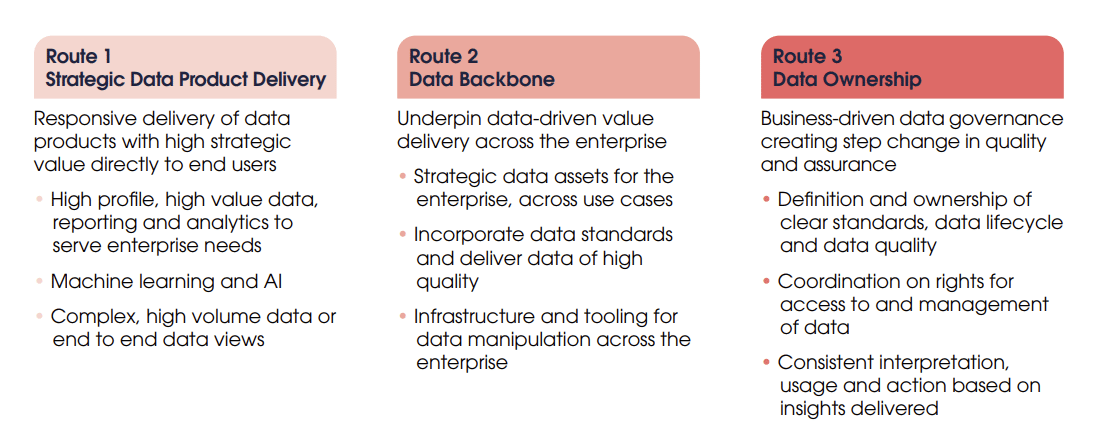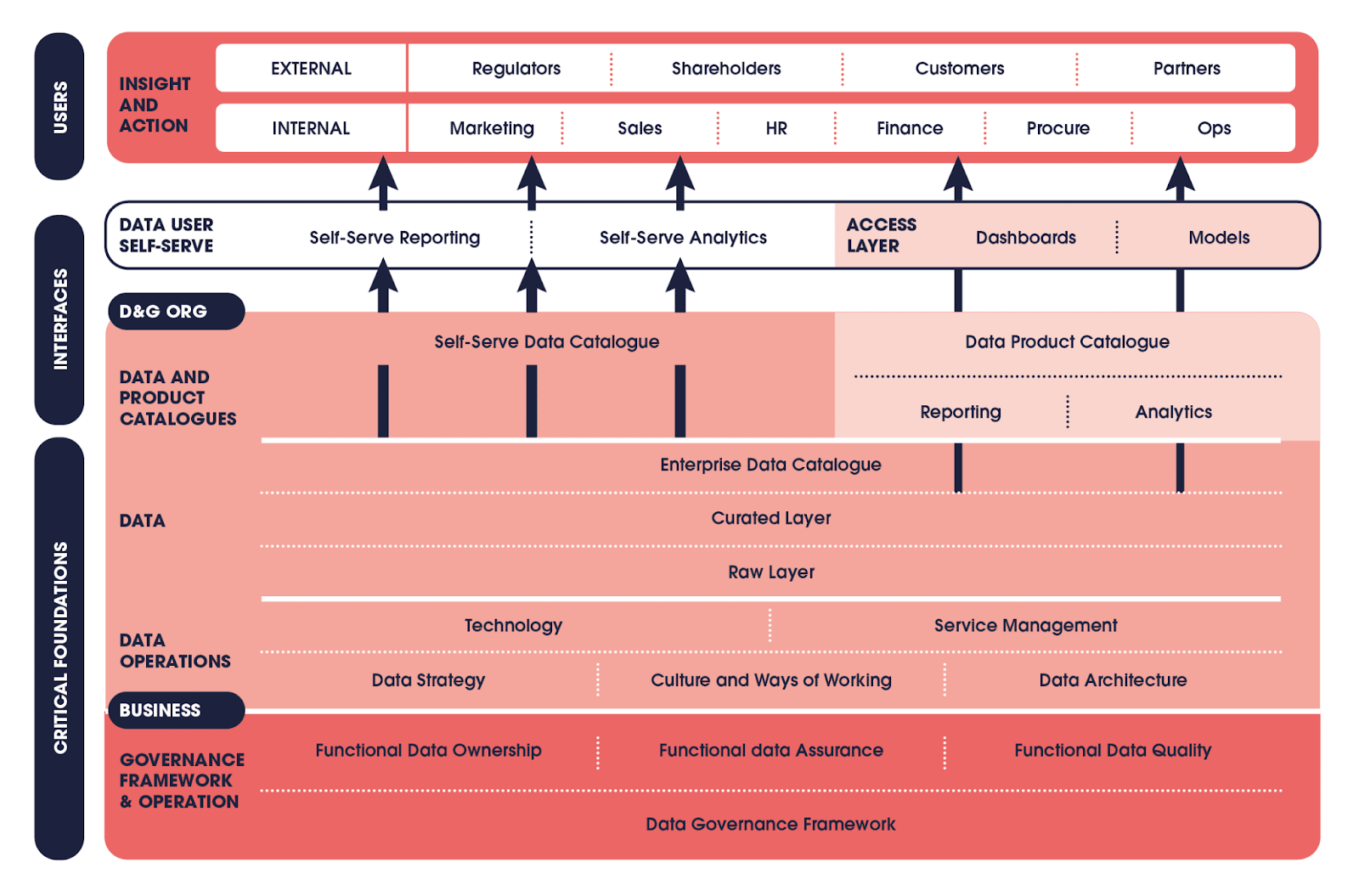If you’ve been exploring ways of optimising your data management and strategy, you’ve likely heard of or been recommended a data platform. But what is a data platform, and do you really need one for efficient data management?
In this guide, we’ll share the benefits and capabilities of a bespoke data platform so that you and your organisation can make a fully informed decision.
What is a Data Platform?
A data platform works as a central, standardised hub for your data. It manages:
- Data collection
- Normalising data (organising it into a database)
- Transforming data (converting, cleaning and structuring it)
- Applying your data (making it accessible and applicable to its audience).
For an in-depth understanding of what a data platform is, explore our guide.
What are the Different Capabilities and Benefits of Data Platforms?
At its simplest, a data platform helps your audience find its data and the data find its audience. Most organisations that have a desire to get more from their data will, at some point, require a data platform. This is driven by the need to solve common challenges:
A simple, unified system:A data platform replaces lots of different ways of working with a unified system, reducing timeframes and avoiding added costs.
Improved data access: Data that was previously spread across multiple systems and therefore difficult to access is unified in a hub. This lets more people effectively access it.
More compatible systems: Legacy design often makes systems too complex or complicated, making manual ‘stitching together’ unviable. A data platform fixes this, ensuring multiple systems work together as a coherent whole.
Simplified IT: A data platform can replace confusing and complex IT and technology solutions, boosting productivity and lowering costs.
Better service architecture: With a custom data platform, you can influence the design and service architecture, driving a better customer and colleague experience.
Improved organisational trust in data: Without a unified data system, there is a lack of trust across data outputs, e.g. “My dashboard is right; yours is wrong”. A single data platform can prevent this, creating a similar experience for all and instilling trust in data.
Reduced skills gap: A lack of specific or specialised skills and knowledge can lead to increased technical and resource costs with complex and less accessible systems. A single, modern data platform reduces the chances of a skills gap emerging.
Optimal data usage: Without a data platform, data is unstructured, not commonly understood and then misused. A single source of truth reduces these risks.
Improved data governance: Correctly implemented, a modern data platform should reduce data governance debt, lower regulatory risk, and boost the overall quality of data.
Higher-quality data and insights: Data platforms speed up access to accurate and timely data. With one, you can leverage a greater volume of higher-quality information to better chart your organisation’s future and increase the pace of change.
Reduced IT costs: Data platforms often reduce the growing cost of supporting multiple legacy IT systems, replacing them with resilient, future-proof, flexible solutions.
Improved developer experience: A single, modern system with an simpler developer experience can deliver compliance in line with industry good practice.
Easier reporting: With a bespoke data platform you can simplify reporting processes, ensuring your data products are easy to create.
To survive as a business in this technology-led world, you need to be able to adapt at a pace like never before. You need to be all over your insights, able to access them quickly, and able to present them in the right way.
A data platform enables you to surface those insights and make the right decisions to transform your business. Your data is the raw material you need to introduce new services and products, wow your customers, and differentiate you from your competitors.
How do Data Platforms Work in Practice?
The diagram below represents many data and analytics capabilities coming together to unlock value from organisational data assets. A data platform alone does not create value but requires an intersection of process, people, and technology conceived around the platform to provide its actual value.
The foundational elements of data ownership in the business set a baseline for platform success. Marrying up good governance with a strong data platform enables the data backbone for an organisation.
Finally, building processes and organisational structures to deliver compelling data products to users is the realisation of what the platform aims to provide. Bringing these together is the basis for creating value from the data held within your organisation.


What do You Need to Consider When Adopting a Data Platform?
While they offer plenty of benefits, data platforms are not the holy grail for solving all your problems in one go.
First, the desired benefits will only come to fruition when there is sufficient governance, as well as standardisation, consolidation and conformity of the data to enterprise architectural standards.
When considering your data platform, we recognise that most businesses operate from a ‘brownfield’ state, in that they often already possess some of the resources and assets they need to implement a data platform. Your business case, therefore, needs to identify what you can reuse – be that people, processes, technology or partners.
But beware, even with these internal capabilities, many in-house teams struggle because they:
- Overlook the connecting ‘glue’ that pulls people, processes and technologies together.
- Struggle to unlock the core data that cuts across the business and data landscape.
- Try to adopt first principles instead of using established blueprints to accelerate and streamline the development process.
You can learn from these observations by asking the following questions during your business case planning phase:
- What are some known data platform ‘prefabrications’ that will help cut development time and costs, whilst still delivering what we need in accordance with company data architecture, security and other related policies?
- Which business outcomes and functions are best served by the data platform, and what data will be required to meet those needs?
- What has to change for alignment across the business, data and technology communities critical to the delivery and ongoing success of the data platform?
Data Platforms vs. Data Architectures, Data Warehouses, and Data Lakes
With so many data concepts out there, it can be confusing to differentiate one from another. Here’s a brief summary of each:
- Data platform: A system which provides end-to-end data management across your business’s data environment: collection, storage, normalisation, transformation, business intelligence, and data observability.
- Data architecture: The framework that dictates your organisation’s data environment. It’s the plan for how data is collected, stored, and delivered, while the data platform is the system which analyses data and moves it through the architecture to where it needs to go.
- Data warehouses and data lakes: The main place where your data is stored, ready to be analysed and processed.
Choose Oakland as Your Data Platform Partner
Data platforms are a crucial part of modern business, simplifying data and putting it to work to achieve your organisational goals. Our experts have the specialist experience, expertise and cross-sector know-how to create and implement yours to enable your transformation.
Explore Oakland’s data platform service offering today, or contact us to discuss how we can tailor our data platform development to your needs. Want to learn more about data engineering and more with Oakland? Step into the world of data through our blog and podcast.


